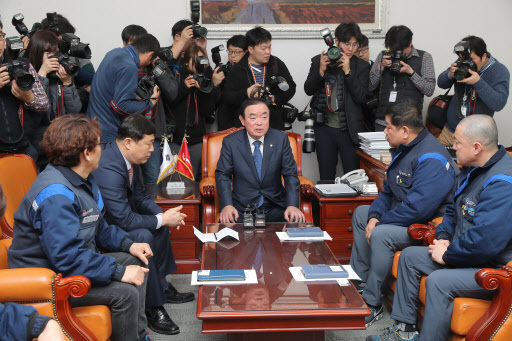General Motors’ decision to shut down its assembly plant in Gunsan, North Jeolla Province, last week has fanned questions regarding the fate of the remaining two factories in the Bupyeong district of Incheon and Changwon, South Gyeongsang Province.
Barry Engle, president of GM International, urged GM Korea and stakeholders to show progress in ongoing discussions by the end of February, “as we are at a critical juncture of needing to make product allocation decisions.”
“GM’s new model assignment will impact the future of the two factories here. So far GM has pressured the government for support without sharing a detailed rescue plan. GM has hinted at the possibility of more aggressive measures due to low profitability. But if GM is committed to saving the local unit, it should also scramble ways boost value here,” said Lee Ho-geun, a professor of automotive engineering at Daeduk University.
The Bupyeong facility consists of two factories-- one that produces the Trax compact sport utility and Aveo subcompact, and the other that is responsible for the Malibu midsize sedan and Captiva SUV.
With a operation rate of 100 percent, the Bupyeong plant manufactured some 340,000 units last year, the company said.
Despite stable operations, critics have raised concerns over the possibility of GM shutting down the Bupyeong plant after two years, when the product lifecycle of the top-selling Trax expires, if GM does not assign new products.
Exports of Trax SUVs produced at Bupyeong plant stood at over 220,000 units last year, from 42,090 units in 2012, the company said.
To continue successful sales of the Trax compact sport utility vehicle, GM Korea has been working on the development of a second-generation Trax, code-named “9BUX,” expected for release between 2020 and 2021.
It, however, has not been finalized whether the new Trax will be allocated for production here, the company said.
 |
Chang Byoung-wan, head of the Trade, Industry, Energy, SMEs and Startups Committee, talks with the GM Korea labor union at the National Assembly. (Yonhap) |
GM Korea’s unionized labor force is also calling for the allocation of a crossover utility vehicle, which the headquarters is putting together for global sales.
Referring to Korea as a “challenge,” General Motors CEO Mary Barra said earlier this month the automaker will take steps that “may result in some rationalization actions or restructuring that potentially could have a material impact on our results.”
The matter has reached the Blue House with President Moon Jae-in calling for a government-led risk management to keep the local economy running.
Dismissing GM’s request for financial support, Moon said in a meeting with aides, “I want you to actively consider all available measures, such as designating a special industrial crisis district or an employment crisis area, should such steps be possible under the current system, and also come up with emergency measures to help those who lose their jobs.“
With hopes of narrowing wage differences, GM Korea and the labor union are set to resume wage talks later this week, while co-heads of Bareun Future Party Park Joo-sun and Yoo Seong-min visited Gunsan on Monday, calling for a thorough review of the situation.
“The shutdown of GM Korea’s Gunsan plant is a catastrophe created by greed of the GM headquarters, neglect from financial authorities and the incompetence of the administration,” Park said.
As part of its global restructuring that began in 2013, GM sold its suffering German-based automaker Opel and automaker Vauxhall Motors to France’s PSA Group last year.
GM’s Europe-exodus took a toll on GM Korea’s exports and slashed operations at its Gunsan plant to below 20 percent.
By Kim Bo-gyung (
lisakim425@heraldcorp.com)







![[Robert Fouser] Accepting migrants in South Korea](http://res.heraldm.com/phpwas/restmb_idxmake.php?idx=644&simg=/content/image/2024/10/31/20241031050896_0.jpg)
